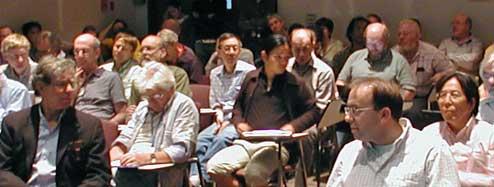
The TRIUMF Users’ recent town hall meeting (August 1st to the 3rd) discussed major new initiatives for the 2010-2015 period. First and foremost was the 60 MeV, 1 Megawatt electron linac driver for radioactive beam production via photo-fission, envisioned as the centrepiece of TRIUMF. The accelerator, along with the second beam line from the TRIUMF proton cyclotron for radioactive beam production by spallation, would put TRIUMF at the forefront of international radioactive ion beam physics. This physics, highlighted by workshop talks from Karlheinz Langanke and Jim Beene, demonstrated the critical nature of experiments using photo-fission products to the understanding of the generation of the matter we observe in the universe.
This electron linac would use superconducting radio-frequency (SRF) technology, the leading edge of international accelerator research. SRF technology is also the key to the success of the International Linear Collider (ILC) and to upgrades of the European Large Hadron Collider (LHC) injector system. By pioneering SRF technology, TRIUMF will be well positioned for central ILC and LHC contributions, strengthening the core research programs of its university joint venture members. These synergies were emphasized in the talks from Lyn Evans (the LHC project leader at the European Laboratory for Particle Physics, CERN) and Chris Adolphesen (ILC expert from the Stanford Linear Accelerator Centre, SLAC). TRIUMF is also pursuing critical research and development of “single crystal” SRF technology with PAVAC, a local company. This R&D could move British Columbia into a leadership position in this emerging technology.
The core ISAC program focusing on understanding the creation of matter in our universe was reviewed. On the last day, working groups studied development of particle detectors for experiments at the high-energy frontier, involvement of TRIUMF in experiments at the Sudbury Neutrino Underground Laboratory (SNOLAB), ultra-cold neutron physics, and material science physics.
The demands on TRIUMF resources by Canadian researchers are enormous. Over the next year, TRIUMF will review requests for laboratory resources and focus its efforts on meeting the needs of its users' community while still maximizing the impact of Canadians on international science. The “five-year plan” for TRIUMF that will emerge from this process will ensure that TRIUMF, its member universities, and Canada will remain competitive at the highest international scientific levels.
